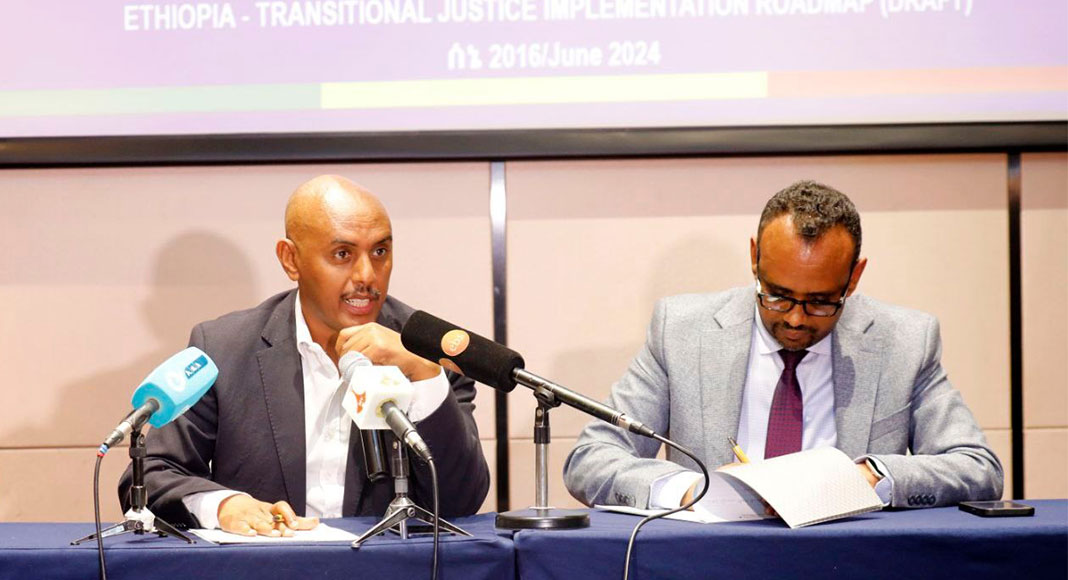
Designated judges, investigators slated to visit Rwanda, ICC for lessons
The federal government is preparing an ‘International Crimes Proclamation’ as part of the transitional justice initiative, according to a new document.
The draft ‘Transitional Justice Implementation Roadmap’ indicates that the proclamation, which will be used to address crimes that have been committed during the violence and armed conflicts of the last few years but are not included under Ethiopia’s existing legal frameworks, will be finalized and tabled to Parliament in the coming two months. The crimes in question include crimes against humanity, torture, forced disappearances, gender-based violence (GBV), and war crimes, according to the roadmap.
It asserts the need to refer to international customary law in order to ensure justice for human rights violations and crimes via the preparation of new legislation, which officials say is critical to the implementation of the transitional justice initiative.
The envisaged law will allow the review of crimes retroactively and empower the Federal Supreme Court, Federal High Court, and other transitional justice institutions to exercise their power to investigate and rule over the criminal offenses.
– Advertisement –
The document reveals that the preparation of other proclamations and regulations necessary for the establishment of the commissions and institutions that will be in charge of implementing transitional justice is also underway.
This includes the establishment proclamation for special courts/benches that will be mandated with reviewing and ruling over transitional justice cases. The legislation will determine the criteria for the selection of judges for the special court branch.
An establishment proclamation for a special attorney general for transitional justice is also in the works. It is expected to lay down the indicators and criteria that will be used to determine whether cases should be reviewed under the initiative. It also defines the criteria for individual and personal jurisdictions to determine involvement in human rights violations. Based on the nature of the cases of transitional justice, this law will determine the kind of investigation to be employed.
The legislation will nullify all forms of immunity, and perpetrators who are based abroad will be extradited to answer for alleged offenses. The law will set terms for cooperation with foreign governments.
The establishment proclamation for the Truth Commission is expected to be ratified in a few months’ time. The Commission will be charged with uncovering truth, determining which cases require justice, pardon, or reconciliation, and executing decisions related to compensation.
Judges, investigators, leaders and experts selected to work in the transitional justice institutions will travel to foreign countries in a bid to extract lessons. These include the criminal courts of Rwanda, where the officials are expected to take part in discussions with judges who participated in the Rwanda genocide inquiries. They will also visit the International Criminal Court (ICC), among other institutions.
The preparation of a comprehensive guide to coordinate transitional justice activities between the federal government and regional administrations is also underway at the Ministry of Justice following the approval of the transitional justice policy by the Council of Ministers last month.
The Ministry is moving to establish the commissions and institutional structures needed to implement the initiatives, as well as two ad hoc institutional mechanisms in the meantime.
The first is the Transitional Justice Ad-hoc Institutional Coordination Mechanism. This will be headed by a committee of 14 leaders pooled from institutions such as Parliament, the ministries of Justice, Finance, Women and Social Affairs, and the Ethiopian Human Rights Commission (EHRC). The Human Rights directorate at the Justice Ministry will serve as the secretariat.
The second is the Transitional Justice Standing Institutional Coordination Mechanism, which will be led by a 13-member committee drawn from the same institutions in addition civil society organizations and manpower from the upcoming commissions and institutions.
These ad hoc institutional mechanisms will oversee the formation of the transitional justice commissions and institutions, resolve any clash of roles among them, and ensure complementary, mutually supportive coordination.
They are slated to last only for the coming five months, until the transitional justice commissions and institutions are established and take over their mandates.
The roadmap indicates a list of all the new legislations, commissions, institutions and tasks required for the transitional justice implementation and the timeline. According to the timeline, most of the tasks at the preparation phase are scheduled for completion by the second quarter of the 2024/25 fiscal year.
The government is also planning to establish a central archive system to store the documents and confidential records from the transitional justice process in one place.
There are also plans to establish a Transitional Justice Museum at the Justice Ministry headquarters.
This post was originally published on this site be sure to check out more of their content.








